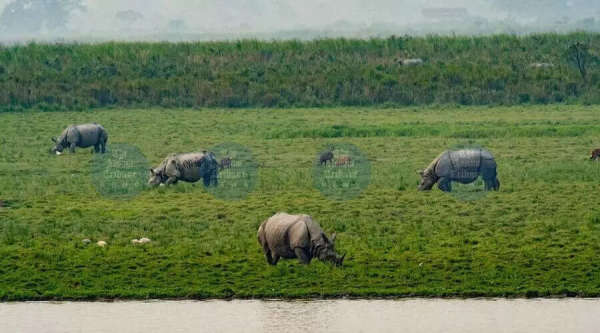
 Cancellation of Kaziranga Expansion
Cancellation of Kaziranga Expansion
In a surprising move, the Assam government has annulled the preliminary notification regarding the ninth expansion of Kaziranga National Park, which was initially announced less than five years ago. This notification, which aimed to add 2,570 hectares to the park, was issued in September 2020. As a result of this cancellation, this ecologically sensitive region will no longer be included in the map of the national park, recognized as a UNESCO World Heritage Site.
The government's inconsistent approach to the conservation of Kaziranga is evident. Earlier in April, it had retracted a proposal for a comprehensive Eco-Sensitive Zone (ESZ) that encompassed 3,600 square kilometers, which included Kaziranga National Park and its ten extensions, as well as several wildlife sanctuaries. The government cited various infrastructural developments within the proposed ESZ, arguing that implementing such a large area without addressing critical boundary and community issues would hinder development, displace populations, and cause long-term socio-economic challenges for vulnerable groups.
Moreover, the Central Empowered Committee (CEC) recently informed the Supreme Court that illegal mining activities have not only persisted but have intensified near Kaziranga National Park, despite a Supreme Court ruling from 2019 that prohibited all mining and related operations in the park's ecosystem. The CEC's report indicated that the Karbi Anglong Autonomous Council (KAAC) has granted new permissions for numerous mines in forested areas and proposed eco-sensitive zones, contravening the Supreme Court's ban and lacking necessary approvals from the standing committee and the National Wildlife Board.
This situation illustrates that Kaziranga has been treated as a commodity, valued more for its land than for the rich ecosystem it has supported for centuries. The park has become a silent casualty of policy compromises, as the government prioritizes immediate economic and political interests over the long-term health of the environment.
The shortage of manpower in national parks such as Manas and Orang further highlights the government's missteps in wildlife and forest conservation. Although ideals of conservation have been promoted through public campaigns and environmental legislation, there exists a significant gap between these ideals and the actual policies and actions, revealing a concerning pattern of hypocrisy.
Such hypocrisy not only undermines authentic conservation efforts but also diminishes public trust. A true commitment to forest and wildlife conservation necessitates that the government aligns its policies with its promises, prioritizing long-term ecological stability over short-term economic benefits while respecting both nature and the rights of those who safeguard it.
It is crucial to prioritize sustainable alternatives and implement stricter regulatory frameworks to protect our remaining natural heritage and ensure a livable planet for future generations.